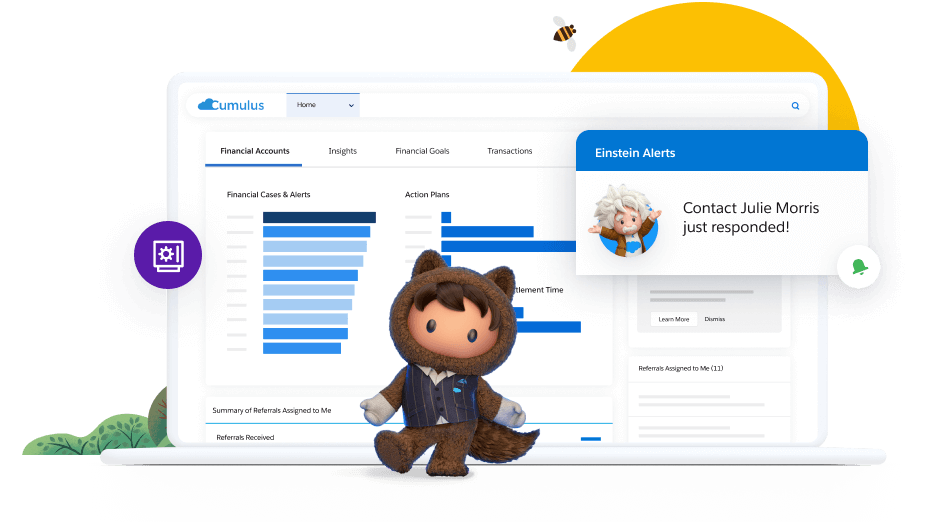
Salesforce has been the most popular CRM solution for over a decade. Your financial services company may already be using Salesforce. While Sales Cloud has multiple benefits for any firm, Financial Services Cloud’s industry-specific capabilities make it a good alternative for many.
We routinely hear from Salesforce Sales Cloud and Service Cloud customers undecided about transitioning to Financial Services Cloud. SP Tech experts can help you choose the best one for your business needs: Sales Cloud vs. Financial Cloud.

Salesforce Financial Services Cloud was designed with commercial and retail banks, wealth management firms, asset managers, and insurers in mind. Create a seamless customer experience for each client, dig deep into performance metrics using artificial intelligence, Einstein Analytics, etc.
Financial Services Cloud improves and expands the capabilities of Sales Cloud and Service Cloud to meet the needs of financial institutions.
FSC is a data model that enables financial services organizations to bring continuous innovation to their customers and employees. The Financial Services Cloud allows you to do the following:
Design processes for the most critical activities in collaboration with other team members. Financial Services Cloud Action Plans to enable your employees to offer uniform and compliant customer engagement experiences through automation and tracking. Automating your operations reduces the risk of human error while simultaneously relieving your employees of time-consuming manual duties.
Action plans enable you to standardize and automate document tracking and approval steps for a variety of processes, as well as track the required activities in the correct sequence. Our clients have used it to gather and examine documents for loan origination, claim management, and new client onboarding, among other things. As a result, the customer experience stays outstanding regardless of the account manager.
When choosing a sales cloud or financial cloud for your business, there are a few things you need to take into account.
First, you need to answer what type of business do you have? If you’re in a highly competitive industry where speed is critical, you’ll want to go with a sales cloud that offers automation. On the other hand, if your business is more focused on long-term relationships and building trust, then a financial cloud that provides more customization and personalization might be a better fit.
It’s also important to consider your budget. Sales clouds can be expensive, so if cost is a factor, then you may want to opt for a financial cloud instead. The best way to choose between a sales cloud and a financial cloud is to weigh up all the key factors and decide which best suits your business needs.
Financial Services Cloud is for you if you work in banking and lending, capital markets, insurance, or wealth and asset management. The financial services environment includes more personalized experiences, real-time internal and external cooperation, predictive analytics, and the elimination of paper operations.
Financial Services Cloud, built on Salesforce, the world’s most popular CRM platform, comes pre-loaded with the core Sales Cloud features and new custom fields and objects for modeling financial accounts, assets, goals, and liabilities for individual clients and households. In other words, Financial Service Cloud helps advisers save time and money by allowing them to customize the CRM to speak the language of their business.
Furthermore, when combined with Salesforce Shield, Salesforce’s Financial Service Cloud provides a comprehensive set of compliance solutions. This means that vast numbers of agents, organizations, and advisors will be able to meet new regulatory requirements.
The best feature of Salesforce’s Financial Service Cloud is that it allows advisors to quickly generate visible and repeatable collaboration across their firm while keeping track of customer discussions and relationships. Furthermore, Salesforce Financial Service Cloud aids financial advisers, organizations, and agents define standard onboarding operations to ensure that the clients’ best interests are constantly at the forefront of every interaction.
At CRM Consulting, you’ll find many Salesforce consultant options that make it easy to hire the right partner for your business. We’ve researched to bring you a qualified list of firms ready to tackle your projects and exceed your expectations. So please take a look around, and filter through our list of companies to find the one that’s perfect for your needs.
You can add up to 5 agencies to your list and contact all of them at once. This will increase your chances of finding the right provider for your needs.